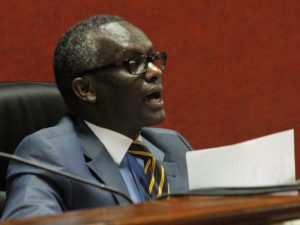
Justice Isaac Lenaola
By MN Reporter
Judges from the East African region have been urged to carefully balance their quest for independence with impeccable exercise of judicial responsibility in order to warrant the trust bestowed upon them.
Mr Justice Isaac Lenaola, of the Supreme Court of Kenya, made a highly-acclaimed presentation to the ongoing East African Magistrates and Judges Association (EAMJA) conference in Kigali, Rwanda in which he said:
“The government is not always the villain when it comes to violating judicial independence. There are cases of private entities in commercial courts infringing on judicial independence. Sometimes even the administration of the Judiciary itself is to blame, with unwarranted transfers, tramped up complaints against judicial officers and so on.”
“What of interference from colleagues? How many times do we seek favours of each other? Are superior Courts such as Court of Appeal and Supreme Courts immune from peer pressure? Do we referee each other to the extent that a Divisional head demands particular approaches to decisions in a division? What of Principal Judges and heads of Courts? Do we prefect our juniors to the extent that in seeking favours they even consult us before making hard decisions?” he asked.
He said the constant attacks and criticisms of Judges by all and sundry “undermines our independence” and gave the example of what happened in Kenya in the aftermath of the nullification of the presidential election on September 1.
Mr Justice Lenaola was categorical: “Judicial independence in its widest sense is a precious pillar of any democracy. Its loss in any significant way portends the collapse of the democracy. We must guard it with all our might.”
His presentation was titled “Balancing Judicial Independence with Judicial Responsibility”.
He said: “We have a duty. We have a calling. And if we are to maintain our independence, then we must be informed only by the oath of office that we take, and the dictates of the system that we serve.”
“How many of us in this region can say that we are safe from the perils that beguile us as judges and that we rule not to please the system, not to please an individual, but to please the Constitution under which we serve,” he asked.
Chief Justice David Maraga, along with the top leadership of judiciaries in Eastern Africa, are attending the conference. It ends tomorrow.
Kenya is expected to host next year’s meeting, which is held annually to deliberate on ways of making the delivery of justice more efficient.
Yesterday, the meeting also discussed the challenge of corruption in the Judiciary and shared experiences from each country.
They talked of instances when there was “negative collegiality” – corrupt officers supporting each other while demonising those who were not corrupt. But they noted that judicial corruption was on the decline in most countries, bolstered by better ways of selecting judges through highly competitive processes, unlike in the past when the Executive made all the appointments.
Kenya’s efforts to digitise case management systems was discussed.
The Judiciary has installed WiFi facilities in most court stations across the country while the digitisation of many court processes has already started. In some courts cases can be filed digitally using e-filing technology, and the Judiciary will soon launch automatic stenography and transcription of court proceedings.
The digitization of Registry systems is also ongoing. This will allow quick and efficient retrieval of files and altogether eliminate the problem of “lost” files.

